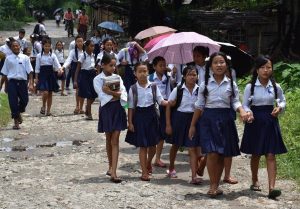An ongoing investigation into the Bhutanese refugee scam reveals the involvement of senior political leaders, bureaucrats, middle-men and prominent activists in an attempt to fraudulently certify Nepali citizens as Bhutanese refugees and resettle them in the U.S. Thirty people have been charged so far with treason, organized crime, fraud, and forgery.
The Bhutanese refugee scam is the most high-profile scandal in recent history in Nepal and comes at a critical time in Nepali politics.
Nepal’s mainstream parties have been synonymous with corruption and putting personal and party interests before national interests. Voters indicated they were looking for a credible alternative and voted for the Rastriya Swatantra Party (RSP) in droves in the last national elections in 2022. Established just a few months before the elections, RSP cashed in on the popular discontent against the parties and emerged as the fourth largest party in the parliament. Their superior performance in the by-elections held last month shows that their influence has only increased. This has shaken the mainstream parties such as the Nepali Congress (NC), Communist Party of Nepal-United Marxist Leninist (CPN-UML), and Communist Party of Nepal- Maoist Center (CPN-MC).
However, many voters are still hedging their bets. They have changed their vote but not their political affiliation. It means they have given the RSP a chance but are waiting to see if it can deliver or if the mainstream parties transform themselves.
In this context, the Bhutanese refugee scam provides Nepal’s three main parties with an opportunity and a risk. They can send a message of their reformation to the Nepali public by conducting a fair investigation and holding all responsible for the scam accountable to the law, irrespective of their party affiliation. This could be the “test” case for the public, who have hedged their bets.
Otherwise, the mainstream parties will find it increasingly hard to win over voters.
The scam also provides Prime Minister Pushpa Kamal Dahal with an opportunity. He is hoping to make an impact with his governance in order to leave a positive legacy. How he deals with the scam will define that legacy.
The refugee scam is not just a concern for domestic audiences. It is of importance to external actors too. As Home Minister Narayan Kaji Shrestha pointed out, “The issue is not merely corruption, but a crime against the state to make Nepali citizens refugees. It has already been internationalized.”
The scam has other international ramifications as well.
In April 2022, the UNHCR suspended the resettlement procedures for certified refugees from Nepal amid reports of efforts by criminal gangs extorting money from Bhutanese refugees in exchange for resettling them to third countries. Therefore, the scam impacts countries that had resettled Bhutanese refugees earlier, such as the U.S., the U.K., Australia, and Denmark, among others. It would not be a surprise if they decide to investigate some cases of Bhutanese refugees resettled on their soil. The partner countries could reject the support they have been extending to Nepal in its management of refugees from other countries such as Myanmar, Bangladesh or Afghanistan.
Many analysts believe that the Bhutanese refugee scam has tarnished Nepal’s image abroad. The scandal has not done Nepal’s image any good. Global trust in Nepal’s bureaucracy and political leadership has been undermined severely.
Yet, this could also be an excellent opportunity for Nepal. Kathmandu could show the rest of the world that it is willing and able to conduct an investigation that involves some of the most senior and powerful political leaders and prosecute the offenders. This will not only help limit the damage done by the scam coming into the open but also improve Nepal’s image and foreign countries’ trust in Nepal’s institutions. After all, Nepal was not a beacon of good governance earlier, and showing that the current institutions can address those limitations would send a positive message. This is contingent upon Nepal managing a fair and proficient investigation.
There is a lot at stake. Many political parties and leaders could see their fortune change drastically. The Nepali public is waiting to see if their faith in institutions will be restored. Foreign actors will judge how much they can trust Nepali institutions. Senior political leaders found in the last election that they are not immune from the voters’ frustration and will soon find out if they are still ‘immune’ from the laws.
The last election was a watershed political moment. This could be a similar moment for Nepali governance.

































